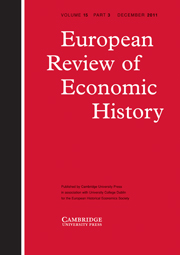Article contents
Clark's intellectual Sudoku
Published online by Cambridge University Press: 01 August 2008
Extract
For many years, Greg Clark was mainly known amongst economic historians for two things – his devasting book reviews are as witty as they are insightful. He also invented a signature recipe for academic articles. Start with a fresh puzzle. Chop some theory and carefully knead into puzzle. Gently squeeze some data and mix well. Garnish with a racy dressing of Cambridge-honed essay-writing skills, while stirring the pot. Then, turn up the heat and watch how the puzzle slowly mushrooms into an ever larger paradox. Wrap into some mystery and serve as is.
- Type
- Research Article
- Information
- Copyright
- Copyright © Cambridge University Press 2008
References
- 6
- Cited by


